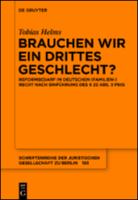Brauchen wir ein drittes Geschlecht?
Reformbedarf im deutschen (Familien-)Recht nach Einführung des § 22 Abs. 3 PStG
| dc.contributor.author | Helms, Tobias | |
| dc.date.accessioned | 2022-11-21T16:33:47Z | |
| dc.date.available | 2022-11-21T16:33:47Z | |
| dc.date.issued | 2015 | |
| dc.identifier | ONIX_20221121_9783110435702_43 | |
| dc.identifier | OCN: 918622453 | |
| dc.identifier.uri | https://library.oapen.org/handle/20.500.12657/59495 | |
| dc.language | German | |
| dc.relation.ispartofseries | Schriftenreihe der Juristischen Gesellschaft zu Berlin | |
| dc.subject.classification | thema EDItEUR::L Law::LN Laws of specific jurisdictions and specific areas of law::LNM Family law | en_US |
| dc.subject.other | Marital status law intersexuality | |
| dc.subject.other | law | |
| dc.title | Brauchen wir ein drittes Geschlecht? | |
| dc.title.alternative | Reformbedarf im deutschen (Familien-)Recht nach Einführung des § 22 Abs. 3 PStG | |
| dc.type | book | |
| oapen.abstract.otherlanguage | In 2013, § 22, para. 3 of the Civil Status Act (PStG) made clear that the civil status of intersexual persons could be entered in birth records without an indication of gender affiliation. However, German family law is still based on a binary gender hierarchy. The lecture examines whether a third sex should be recognized or if instead, gender should be eliminated altogether as a category in family law. | |
| oapen.identifier.doi | 10.1515/9783110435702 | |
| oapen.relation.isPublishedBy | 2b386f62-fc18-4108-bcf1-ade3ed4cf2f3 | |
| oapen.relation.isbn | 9783110435702 | |
| oapen.relation.isbn | 9783110441819 | |
| oapen.relation.isbn | 9783110433463 | |
| oapen.imprint | De Gruyter | |
| oapen.series.number | 193 | |
| oapen.pages | 30 | |
| oapen.place.publication | Berlin/Boston |

